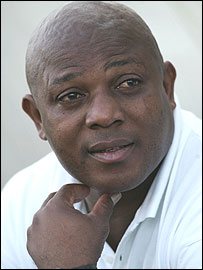A Quote by Clarence Seedorf
People don't come to the stadiums for every match because if there is a game every three days, it is difficult. You need to make games more exclusive and make them more special.
Related Quotes
We face a campaign of fear and division every day at the workplace or every time we try to organize a work site. We're able to get through that by talking through the facts and having people join together. Donald Trump, I will say three things about Donald Trump. One, he's unfit to be president. Two, he would make it much more difficult for working people to make ends meet. And, three, he would tear our country apart.
Football is more disputed in England than it is in Italy. Every match is a very hard match because the referee doesn't blow his whistle as much as in Italy, and every team plays against each other like it is a final. I enjoy it more in England because you have to think quicker. The pace of the game is faster, so you don't have much time to think.
Rules of Play is an exhaustive, clear, cogent, and complete resource for understanding games and game design. Salen and Zimmerman describe an encyclopedia of game design issues, techniques, and attributes. In particular, they analyze the elements that can make a game experience richer, more interesting, more emotional, more meaningful, and, ultimately, more successful. It should be the first stop you make when learning about game design.
It is, of course, a luxury to create art and, on top of this, to insist on expressing one's own artistic opinion. Nothing is more luxurious than this. It is a game and a good game, at least for me; one of the few games which make life, difficult and depressing as it is sometimes, a little more interesting.
I'll tell them how I survive it. I'll tell them that on bad mornings, it feels impossible to take pleasure in anything because I'm afraid it could be taken away. That's when I make a list in my head of every act of goodness I've seen someone do. It's like a game. Repetitive. Even a little tedious after more than twenty years.
But there are much worse games to play.
The indoor game is much more of a team game, having to work effectively with a group of 15 to 20 people, striving to improve every day, every drill, even every contact. The beach game is much more of an individual game within a team sport, much less about organized practices with coaches and much more about just playing the game.
But to procrastinate and prevaricate simply because you're afraid of erring, when others - I mean our brethren in Germany - must make infinitely more difficult decisions every day, seems to me almost to run counter to love. To delay or fail to make decisions may be more sinful than to make wrong decisions out of faith and love.






































